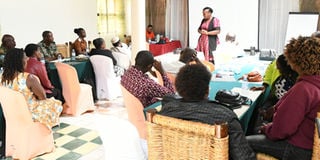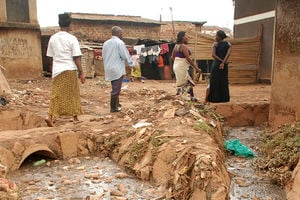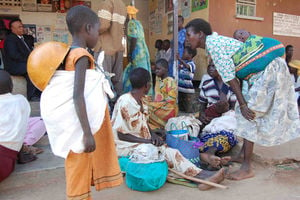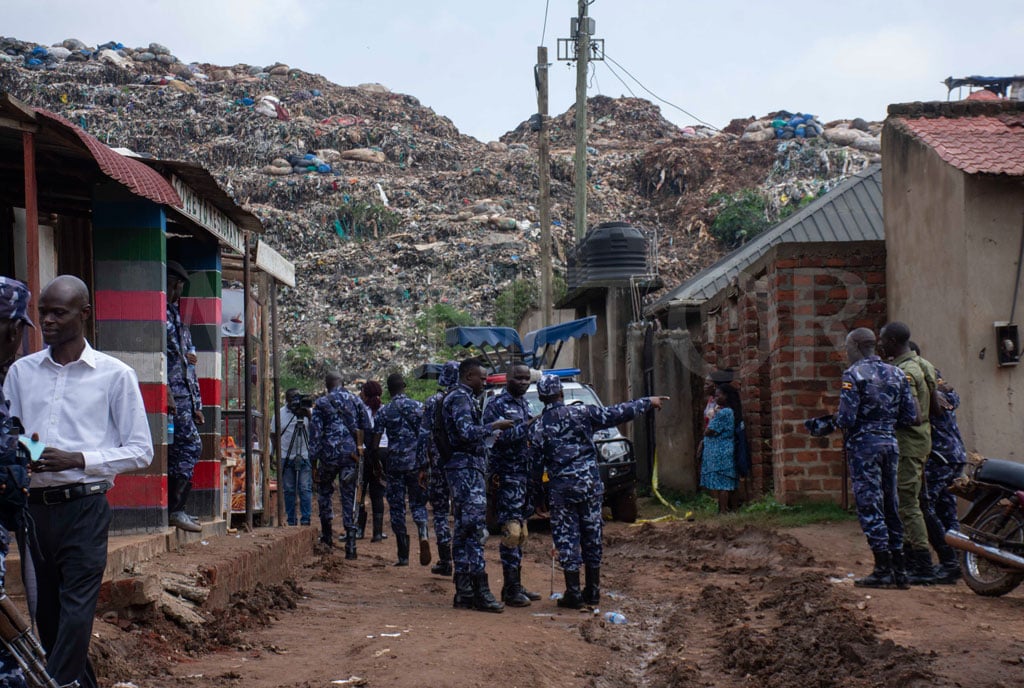
Betty Mujungu, Fort Portal deputy mayor Ms addresses stakeholders during meeting about HIV/Aids in Fort Portal on July 9. PHOTOs | ALEX ASHABA
A recently released report from the Uganda AIDS Commission (UAC) indicates that the HIV prevalence rate in Fort Portal City, Kabarole District, is the highest in the country at 17.8 percent, up from 14.6 percent in 2020. This is significantly above the national average of 5.1 percent.
These high numbers have been attributed to new infections, especially among adolescents and women. In six months (October 2023 to March 2024), health facilities within the city registered 529 new infections, 322 of which were women and girls.
At 26, Sandra Arinaitwe, a shop owner and resident of Kagote village, in Central Division, Fort Portal City, has no problem sleeping with older men, as long as they can give her money to maintain her standard of living.
“Sugar daddies have made it in life. They have assets and money, which can support young girls such as myself who do not have the money to navigate life's challenges. He will give you money every time you ask for it, something that a man my age cannot do. Young men deceive girls that they will marry them, yet they have numerous girlfriends,” she says.
Sadly, though, Arinaitwe admits that in her experience, older men do not welcome the use of condoms.
“Even the few who accept to use condoms eventually take them off during the encounter. If your motive is to get money or job connections from this man, you cannot force him to wear a condom. Most older men want unprotected sex, anyway,” she explains.
Because of the transactional nature of the relationship and the fact that the older man is more likely than not to be married, Arinaitwe often returns to her on-and-off youthful boyfriends.
“If I accidentally contract HIV from a sugar daddy, I will spread it to my age mates,” she says with finality.
"Older men believe that when they give you money, they have a right to unprotected sex. Sometimes, we test before the first encounter, but subsequent meetings often lack testing. I know I belong to the key populations, so I take Pre-exposure prophylaxis (PrEP) to protect myself," Daphne Kemigisa, a 20-year-old woman supplements.
PrEP is medicine taken before a sexual encounter to prevent contracting HIV. If taken as prescribed, PrEP reduces the risk of getting HIV from sex by 99 percent.
HIV infections on the rise
Dr Solomon Asiimwe, the city’s health officer, attributes the surge in new infections to high teenage pregnancy rates.
“Currently, the teenage pregnancy rate for Fort Portal City stands at 22 percent. Teenage pregnancies have a direct impact on HIV numbers. However, we can also blame the reckless behaviour of having unprotected sex among both married and unmarried individuals who have multiple partners,” he says.
He adds that financial distress puts the youth at risk, leading them to engage in risky behaviour.
“Commercial sex work is rampant in Fort Portal. Some people do not disclose their HIV status and yet refuse to use condoms during sexual encounters due to myths about their effectiveness and comfort. I am advocating for the use of the ABC method if we are to reverse these high numbers,” he says.
The ABC method involves abstinence for unmarried youth, faithfulness to one partner for married couples and consistent condom use. A paper published in the PLoS Medicine journal found that in the early 1990s, the ABC behavioural change method cut Ugandan’s HIV prevalence by two-thirds.
The HIV messages at the time, broadcast on TV and radio, made passionate moral exhortations, bringing about widespread changes in sexual attitudes and practices. HIV prevalence in Uganda peaked in 1991 at about 15 percent of the adult population and declined to about five percent in 2001.

Evan Amara, the Fort Portal City HIV/Aids focal person, addresses stakeholders during an HIV/AIDs meeting on June 20.
However, over time, the ABC method has proven to be ineffective in containing the rise of new infections. The paper suggests that by focusing on individual behaviours, the ABC approach does not acknowledge the underlying factors that make people vulnerable to HIV.
“The ABC campaign assumes abstinence will allow young women to focus on going to school …. and yet it fails to acknowledge the social circumstances driving sex in the first place. Many sexual relations include transactional or commercial sex, to pay for post-secondary schooling and to gain financial independence from family obligations,” the authors write.
The authors also state that, "Ironically, by promoting monogamy as a prevention measure, this campaign negates one of the highest risk groups in Africa; monogamous, married women.”
The UAC report shows that by March 2024, Fort Portal City had 20,646 people living with HIV and on anti-retroviral treatment (ART). Of these 12,864 are women while 7,782 are male, indicating a higher number of infected women compared to men.
Several married women, such as 41-year-old Beatrice Tibahwa, engage in reckless behaviour. She is into young men.
“I do not demand much from the young men I sleep with. I only want sex, while I provide them with all the good things I can afford, including cooking tasty dishes for them and bathing them. By the time he leaves my home, he is relieved of all the stress he came with. If we are to stop new HIV infections, our husbands should remain faithful to us, so that we do not look for sex elsewhere,” she says.
Tibahwa adds that she has never used PrEP or post-exposure prophylaxis (PEP), before or after a sexual encounter, respectively.
Why low uptake of PrEp
A 2021 study published in the Lancet Public Health journal, found that more than a decade after the first efficacy evidence for oral PrEP was reported, its uptake globally has been inadequate and global HIV prevention targets have been missed.
“By 2020, it was estimated that just less than one million people had initiated oral PrEP, far less than the 2020 UNAIDS target of three million. By the end of 2020, fewer than 20 countries recorded more than 10,000 PrEP initiations. Although some countries have incorporated PrEP into their national health systems, many low-and middle-income countries rely on programmes funded by international donors and others provide access only to some people who are at risk,” the report says.
Evan Amara, the HIV/Aids focal person for Fort Portal City, says by the end of March, 700 people, most of whom belong to the key populations, had approached health facilities for PrEP services. The key populations include sex workers, men who have sex with men, discordant couples and people with multiple partners.
“Our health facilities offer PrEP free of charge. Data from these facilities shows that by March 2024, 1,124 people were screened for PrEP. Of these, 423 were found eligible. Everyone is entitled to PrEP but it depends on how he or she is at risk of contracting HIV. Those on a sexual network are advised to start taking PrEP while others choose other preventative measures,” she says.
Amara adds that the uptake of PrEP increases with the number of people who fall under the key population category. However, to increase uptake, city authorities are carrying out awareness and sensitisation campaigns.
“The 1,242 people who were screened for PrEP are girls aged 15-24 years representing 59 percent of the population. Fort Portal is a regional city that serves districts in the Rwenzori and Tooro sub-regions. As a city, we are particularly concerned about new infections, especially among adolescents,” she says.
Currently, Uganda has 67,950 PrEP users, while Kenya has 82, 886 and Tanzania has 22,147 PrEP users.
Are sex workers the problem?
The Crane Survey IBBS project, conducted between May and October 2021 in downtown Kampala, found that the number of HIV-infected female sex workers stood at 45 percent. Out of every 10 female sex workers, aged between 30-49, four or five were infected.

A health worker draws blood for HIV testing at Buhinga Play Ground in Fort Portal City in 2018.
The study was a collaboration of the Population Council, Makerere University School of Public Health, Centres for Disease Control and Prevention, Infectious Diseases Institute, and the Ministry of Health.
The study also found that while the overall prevalence of HIV among female sex workers in Kampala remained at 31 percent, it was high compared to 7.1 percent among women in the general population. At 92 percent, most of the sex workers were aware of their HIV status, with 85 percent of those being on treatment.
Fort Portal City has more than 2,500 sex workers. However, Maureen Kyobutungi, the executive director of Kabarole Women Health Initiative, an organisation that recognises the need for a safe and healthy environment for all women, refutes the assumption that street sex workers are the primary cause of the new HIV infections.
“While some sex workers are HIV positive, we have empowered them to use condoms and most of them know their status. The problem lies with men who refuse to use condoms. Since 2017, we have been interacting with sex workers who are raped after refusing to have unprotected sex. Even lodge owners make complaints after men who refuse to use condome end up fighting with the sex workers and end up destroying property,” says Kyobutungi, a sex worker.
And although the rape cases are reported to the police, she says, many raped women are yet to find justice.
"We once received a complaint where a girl was gang raped. She negotiated with one man, but on reaching the lodge, she found three other men. The girl was HIV positive and we reported the case to police. The girl disappeared after a few days, but the rapists were given PEP to keep them from contracting HIV,” she says.
Jane Katusiime, a sex worker, says she has been beaten and raped several times by her clients.
“I am HIV positive and I got the disease after I was raped. Most of the men who come to me are married. They become completely deaf when I start talking about their risk of contracting HIV from me. A week ago, a man tried to rape me but we fought and I overpowered him,” she says.
Taking risks is an inherent part of Katusiime’s job. However, she says, she has reported cases at the police station and made complaints to other organisations. These organisations now help her obtain ARVs.
“Even if I am HIV positive, I do not want to mix other people’s HIV in my body,” she says.
In 2020, Fort Portal City Council developed a five-year HIV/Aids strategic plan from 2020/21 to 2024/25, which is being implemented; focusing on increasing productivity and quality of life for both affected and infected persons. The document also streamlines the city’s efforts to promote responsible parenting and the keep youth in school.
Additionally, the city will adopt strategies to manage the influx of truck drivers. However, the rise in prevalence rates shows that the strategic plan might not be working.
Last month, an HIV prevention study found that twice-a-year injections of Lenacapavir, an antiviral drug, were 100 percent effective in protecting people from contracting HIV. The study was conducted among young women in South Africa.
While Uganda’s access to the product may be light years away, the question remains if people will embrace it, much more than they have embraced PrEP.
The UAC report shows that Mbarara City follows closely behind Fort Portal City at 14.4 percent HIV prevalence rates, followed by Gulu City at 11.3 percent and Masaka City at 11.2 percent.
The 2023 Uganda HIV/Aids fact sheet indicates that as of December 2022, Uganda had 1.4 million people living with HIV/AIDS, with 19,000 being young people aged 15-24 years.








